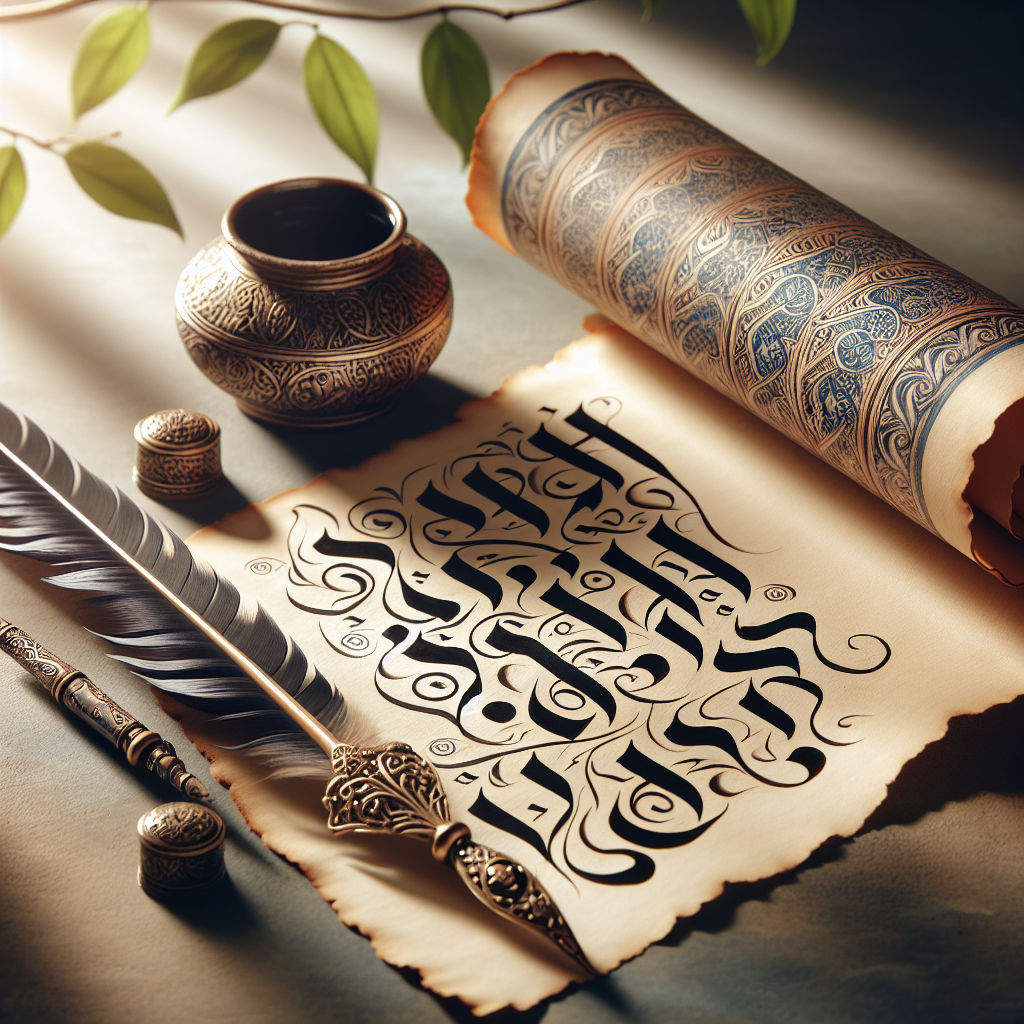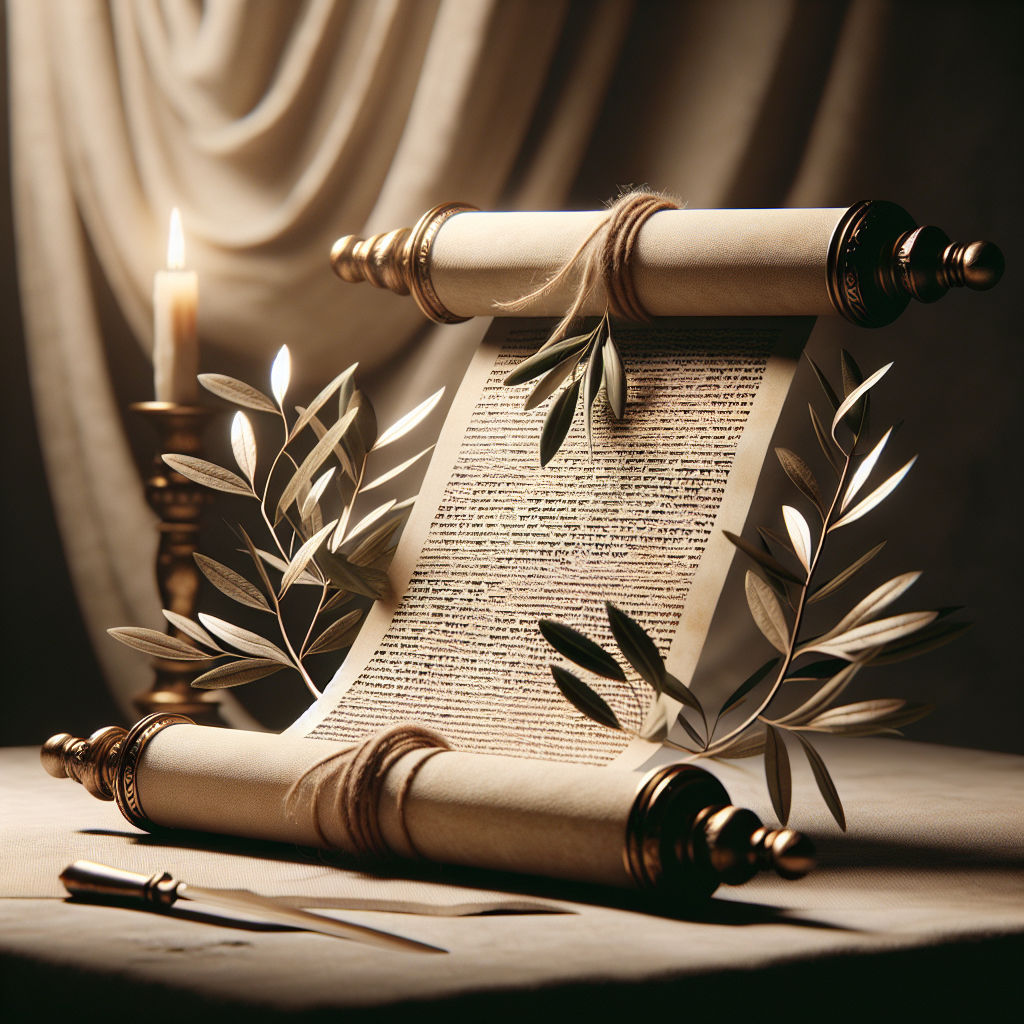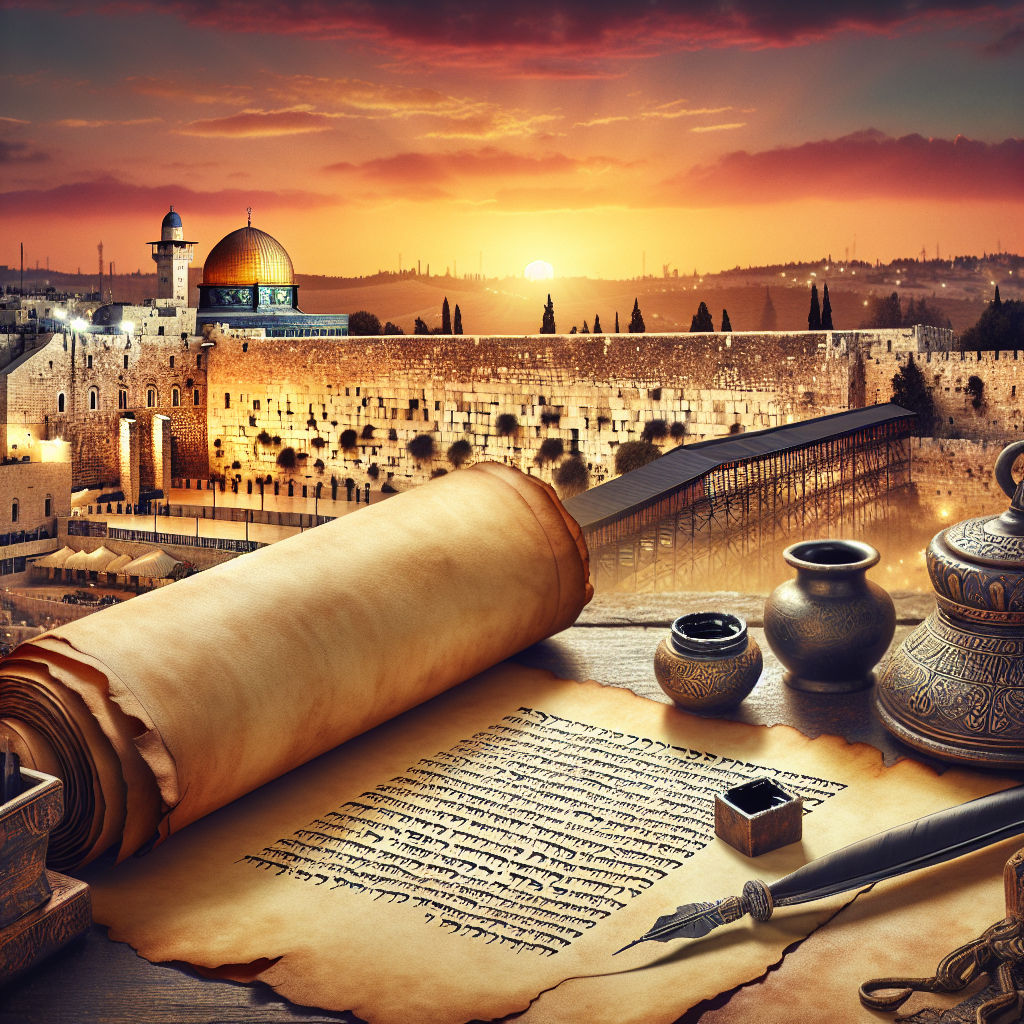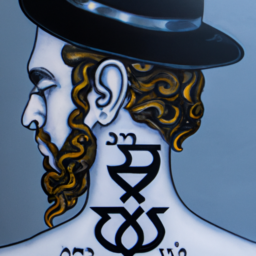“Best Practices for Getting a YHWH Tattoo in Hebrew Script”
Introduction to the Significance of YHWH Tattoos
In recent years, the trend of spiritual and religious tattoos has seen a significant rise, with individuals seeking to express their faith and beliefs in a permanent and personal way. Among these, YHWH tattoos hold a special place, especially within the context of Hebrew culture. YHWH, pronounced as “Yahweh,” is the Tetragrammaton, or the four-letter biblical name of the God of Israel. This name is considered incredibly sacred in Judaism and is traditionally not spoken aloud, replaced in reading by “Adonai,” meaning “Lord.”
The significance of YHWH in Hebrew culture cannot be overstated. It represents the unchanging, eternal, and self-existent nature of God. For many, choosing to inscribe YHWH on their skin is not just a matter of religious declaration but also a profound personal commitment to the values and beliefs that this name embodies. It’s a symbol of devotion, a reminder of the divine presence in one’s life, and sometimes, a testament to a transformative spiritual experience.
However, the decision to get a YHWH tattoo is not without its complexities. It’s a choice that intertwines deep religious significance with contemporary tattoo culture, and it requires a thoughtful understanding of both.
Understanding the Cultural and Religious Implications
The sacredness of the Tetragrammaton is paramount in Jewish tradition. According to the Torah, the name of God is so holy that it must be treated with the utmost respect. This extends to the written name as well, which is why you’ll often find Jewish texts treating it with special care, such as not disposing of them in the usual way if they contain the name of God.
For those outside the Jewish faith, the considerations are manifold. While non-Jews are not bound by Jewish law, the act of inscribing a YHWH tattoo can be seen as a form of cultural appropriation, and it’s essential to approach this with sensitivity. It’s crucial to understand the potential implications and to respect the origins and sanctity of the Tetragrammaton. This is not to say that only those of the Jewish faith can or should get a YHWH tattoo, but rather that anyone considering it should do so with a deep respect for its cultural and religious significance.
Moreover, there’s a broader conversation about the appropriateness of religious tattoos. Some argue that tattoos are a form of self-expression and should be free from religious constraints, while others believe that religious symbols should be kept sacred and not used as body art. This debate is highly personal and varies greatly depending on individual beliefs and cultural backgrounds.
Choosing the Right Tattoo Artist
Once you’ve navigated the cultural and religious implications and decided to move forward with a YHWH tattoo, finding the right tattoo artist becomes your next crucial step. Hebrew script is beautiful but complex, and it’s imperative to choose an artist who is not only skilled in tattooing but also experienced with Hebrew script. A single stroke can change the meaning of a character, and an inexperienced artist could inadvertently alter the sacred text.
When researching tattoo artists, look for those who have a portfolio that includes Hebrew script or similar intricate lettering styles. Don’t hesitate to ask for references or to speak to previous clients about their experiences. A reputable artist will be transparent about their work and happy to share their expertise.
Additionally, consider the artist’s understanding of the cultural significance of the tattoo. An artist who appreciates the weight of what they’re inscribing on your skin is more likely to approach the task with the reverence and precision it deserves.
Here are a few tips for selecting the right tattoo artist for your YHWH tattoo:
1. **Research**: Start by looking online for artists who specialize in religious or Hebrew tattoos. Check out their reviews and ratings on various platforms.
2. **Portfolio**: Examine the artist’s portfolio carefully to ensure they have experience with Hebrew script. Look for crisp, clear lines and correct character proportions.
3. **Consultation**: Schedule a consultation with the artist to discuss your tattoo. This is a great opportunity to gauge their knowledge and comfort with your design.
4. **Hygiene**: Make sure the tattoo studio follows strict hygiene practices. A clean and professional environment is crucial for your safety.
5. **Comfort**: Choose an artist you feel comfortable with. Getting a tattoo is an intimate process, and you should feel at ease with the person marking your skin.
In conclusion, the journey of getting a YHWH tattoo is one that intertwines personal faith with cultural respect. It’s a path that requires careful consideration of the implications, a deep understanding of the symbol’s significance, and a commitment to finding the right artist who can bring this sacred text to life on your skin. With the right approach, a YHWH tattoo can be a beautiful and meaningful expression of your spiritual journey.

The Importance of Accurate Translation
When it comes to tattoos, especially those that are as deeply rooted in spiritual and cultural significance as the YHWH tattoo, the accuracy of the translation is paramount. YHWH, the Tetragrammaton, represents the most sacred name of God in the Hebrew Bible. It’s a name that is held in such high esteem that it is never spoken aloud in Jewish tradition, and its written form is treated with the utmost respect. This underscores the importance of ensuring that the spelling and meaning of YHWH are correct when you decide to inscribe it on your body.
The Hebrew language is complex, with characters that may look similar to the untrained eye but carry vastly different meanings. A single stroke can change the entire context of a word, turning a symbol of deep respect into one of inadvertent disrespect. This is why, if you’re considering a YHWH tattoo, you must consult with a Hebrew language expert. This could be a rabbi, a Hebrew scholar, or a native speaker who understands the nuances of the script and the cultural significance behind it.
Moreover, Hebrew is written from right to left, which is the opposite of English and many other languages. This detail is crucial when it comes to tattooing, as the direction of the script must be preserved to maintain its meaning. An expert can provide guidance on the correct orientation and ensure that the tattoo artist understands how to properly transfer the design onto your skin.
It’s not just about the script itself; it’s about the intention behind it. By taking the time to ensure the accuracy of your YHWH tattoo, you’re showing a level of respect and mindfulness that aligns with the sanctity of the symbol. This is not a step to be taken lightly or rushed through. It’s a part of the process that deserves as much consideration and reflection as the decision to get the tattoo in the first place.
Deciding on the Tattoo Placement
Once you’ve ensured the accuracy of your YHWH tattoo, the next step is to decide on its placement. This decision is as personal as it is significant, and it involves a delicate balance between visibility and respect for the sacred text. In many cultures, the placement of a tattoo can carry symbolic meaning. For instance, a tattoo on the heart might signify love and devotion, while one on the arm might represent strength and action.
When it comes to religious texts, however, there are additional considerations. For some, placing a sacred name like YHWH on the feet or lower parts of the body might be seen as disrespectful, as these areas can be associated with the mundane or even the profane. Conversely, placing the tattoo on the upper body, closer to the heart or the head, might be viewed as a sign of reverence, as these areas are often associated with thought and emotion.
It’s also worth considering how visible you want your tattoo to be. Some people choose to wear their faith openly, opting for a placement that is easily seen by others. This can invite questions and discussions about their beliefs, which can be a powerful way to connect with others. On the other hand, you might prefer a more private placement, something that serves as a personal reminder rather than a public declaration.
Ultimately, the placement of your YHWH tattoo should reflect your personal relationship with the symbol. It should be a place that feels right to you, one that will serve as a constant reminder of the values and beliefs that are important in your life. Whether it’s on your wrist, your shoulder, or somewhere only you know about, the placement is a part of the story that your tattoo tells.
Pre-Tattoo Considerations and Preparations
Before you sit down in the tattoo artist’s chair, there’s a period of reflection and preparation that should take place. Getting a tattoo, especially one with the weight of YHWH, is not something to be done on a whim. It’s a decision that should be arrived at after careful consideration of what this symbol means to you and how it fits into your spiritual or personal journey.
Reflect on your reasons for choosing this particular tattoo. Is it a testament to your faith, a reminder of your cultural heritage, or a symbol of a personal belief system? Understanding your motivations will not only solidify your decision but also help you explain your tattoo to others who may ask about it.
Physically preparing for a tattoo is also important. Make sure you’re well-rested and have eaten before your appointment. Avoid alcohol and aspirin, as they can thin your blood and affect the tattooing process. It’s also a good idea to wear comfortable clothing that provides easy access to the area where you’ll be getting tattooed.
Mentally preparing is just as crucial. Tattoos can be painful, and the process can be lengthy, depending on the size and complexity of the design. Prepare to sit still for an extended period and to manage any discomfort you might experience. Remember, this is not just a physical process but a spiritual one as well. The pain can be seen as a rite of passage, a small sacrifice for a symbol that will carry deep personal significance for the rest of your life.
In conclusion, the journey to getting a YHWH tattoo is one that involves careful consideration, respect for the cultural and religious significance of the symbol, and a deep understanding of one’s own beliefs and motivations. By ensuring the accuracy of the translation, thoughtfully choosing the placement, and preparing both mentally and physically for the process, you can ensure that your YHWH tattoo is a meaningful and respectful tribute to the sacred Tetragrammaton.

The Tattooing Process: What to Expect
Embarking on the journey of getting a YHWH tattoo is not just about making a fashion statement; it’s a profound expression of faith, spirituality, or a personal connection to Hebrew culture. If you’ve decided to inscribe this sacred Tetragrammaton on your skin, it’s essential to know what lies ahead in the tattooing process. This experience is as much about the ritual itself as it is about the permanent emblem you’ll carry with you.
Firstly, when you enter the tattoo studio, you’ll be greeted by the buzz of needles and the sight of art adorning the walls – a testament to the stories etched on skin. Your chosen artist, hopefully someone with a deep understanding of Hebrew script, will guide you through the final design and placement. This is your last chance to make any adjustments, so it’s crucial to be certain of your choices.
As you settle into the chair, the artist will prepare your skin, ensuring it’s clean and ready to be tattooed. They’ll transfer a stencil of the YHWH design onto your chosen spot. Take a moment to check the placement and spelling one last time. Remember, this is not just any tattoo; it’s a representation of something much greater.
The actual tattooing begins with the first touch of the needle. It’s a sensation that can range from a mild annoyance to a significant discomfort, depending on your pain threshold and the tattoo’s location. Breathe deeply and focus on the significance of the moment. Each line and curve brings you closer to a permanent reflection of your beliefs.
Throughout the session, your artist will periodically wipe away excess ink, giving you glimpses of the emerging script. It’s a process that requires patience and trust – patience for the time it takes to perfect the tattoo and trust in the artist’s skill to honor the sanctity of the YHWH inscription.
Once the tattoo is complete, the artist will clean the area and apply a bandage or protective film. They’ll provide you with aftercare instructions, which are crucial for the healing process. This is not the end of your journey; it’s the beginning of carrying a sacred symbol with you every day.
Aftercare and Maintenance of Your Tattoo
The importance of aftercare cannot be overstated. Proper healing is essential to ensure that your YHWH tattoo remains a clear and vibrant tribute to your convictions. The first few weeks are critical, and following your artist’s advice will prevent infection and preserve the quality of your tattoo.
Initially, you’ll need to keep the tattoo clean and dry. Gently wash the area with mild, fragrance-free soap and pat it dry with a clean paper towel. Avoid soaking the tattoo in water or exposing it to direct sunlight. Both can cause damage and fade the ink prematurely.
After a few days, you’ll notice the tattoo beginning to peel. This is a natural part of the healing process, and it’s vital not to pick or scratch at the scabs. Doing so can pull out the ink and lead to patchy areas. Instead, apply a thin layer of fragrance-free moisturizer to soothe the itching and keep the skin supple.
As the tattoo heals, you’ll need to continue moisturizing and protecting it from the sun. Even after it’s fully healed, applying sunscreen can prevent fading, ensuring that the sacred YHWH script remains legible and bold for years to come.
Dealing with Criticism or Questions About Your Tattoo
Choosing to wear a YHWH tattoo can invite curiosity, questions, and sometimes criticism. It’s a symbol that carries deep religious significance, and not everyone may understand your reasons for choosing it.
When faced with inquiries, embrace the opportunity to share your story. Explain the personal meaning behind your tattoo, whether it’s about your faith, heritage, or a connection to the Hebrew language. Most people will appreciate your openness and the significance it holds for you.
However, there may be times when you encounter criticism, especially from those who hold the Tetragrammaton in high regard and may view its use in a tattoo as disrespectful. It’s important to respond with grace and understanding. Acknowledge their perspective and explain your intentions with sincerity. Your tattoo is a personal expression, and while it’s important to be respectful of differing views, you also have the right to express your beliefs in the way you choose.
In conclusion, the journey of getting a YHWH tattoo is a deeply personal one, filled with anticipation, reflection, and, ultimately, fulfillment. From the careful precision of the tattooing process to the diligent aftercare and the conversations it may spark, your tattoo is more than just ink on skin—it’s a testament to your journey and the enduring connection to the Hebrew script and culture. Embrace each step with the knowledge that you are honoring a tradition that is ancient, sacred, and now a part of you.

Embracing the Journey and Significance of a YHWH Tattoo
When you make the decision to etch the sacred name YHWH onto your skin, you’re not just getting a tattoo; you’re embarking on a profound journey that intertwines with the very fabric of Hebrew culture and spirituality. This isn’t a choice made lightly, nor is it one whose significance fades with the passing of time. Instead, it’s a constant, living connection to a tradition that has weathered millennia, a personal testament to faith, identity, or perhaps a complex interplay of both.
The journey begins long before the needle touches your skin. It starts with an inner calling, a whisper that grows louder, urging you to bear the name of the divine in a way that’s as permanent as it is personal. This calling is deeply individualistic, and yet, it resonates with the collective experience of countless others who have felt drawn to the same sacred symbols. The reasons for choosing a YHWH tattoo are as varied as the people who wear them. For some, it’s a declaration of faith, an outward sign of an inward grace. For others, it’s a tribute to heritage, a link to ancestors whose voices echo through history. And then there are those who see it as a philosophical emblem, a reminder of the mysteries of existence that lie just beyond human comprehension.
As you reflect on your personal reasons for getting a YHWH tattoo, you may find yourself delving into the depths of your own beliefs and values. This introspection is a crucial part of the process, one that adds layers of meaning to the ink that will soon become part of your story. It’s a time for contemplation, for understanding not just the ‘what’ but the ‘why’ of your decision. This is not a step to be rushed; it’s a period of preparation that sets the stage for the transformation to come.
The act of tattooing itself is a ritual, a rite of passage that has been practiced by cultures around the globe for centuries. There’s something inherently spiritual about the experience, a sense of connection to all those who have come before and all who will follow. As the design takes shape on your skin, you may feel a range of emotions—pain, certainly, but also exhilaration, peace, and a profound sense of purpose. This is more than art; it’s a statement of identity, a physical manifestation of your innermost self.
Once the tattoo is complete, the journey is far from over. In fact, it’s just beginning. As you step out into the world, your YHWH tattoo becomes a part of your public persona, a topic of conversation, and perhaps even a source of inspiration or curiosity for others. It’s an opportunity to share your story, to explain the significance of the name that now marks your body. And yes, there may be criticism or questions, but these, too, are part of the journey. They’re chances to engage, to educate, and to stand firm in your convictions.
The lasting impact of a YHWH tattoo is difficult to quantify. It’s a daily reminder of the values and beliefs that you hold dear, a symbol that can offer comfort in times of trouble and joy in moments of celebration. It’s a link to a rich cultural heritage, a piece of history made flesh. And as the years pass, it becomes a testament to the enduring nature of faith, a visual chronicle of your personal evolution.
In the end, the journey of getting a YHWH tattoo is as unique as the individual who chooses to take it. It’s a path marked by reflection, courage, and an unshakeable connection to the Hebrew script and culture. For those who walk this path, the YHWH tattoo is more than ink on skin—it’s a sacred emblem, a lifelong companion, and a profound declaration of the human spirit’s capacity for reverence and wonder.
